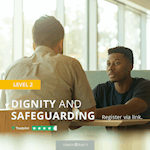Dignity and Safeguarding Level 2
Online FREE course to learn how to better serve the needs of vulnerable adults
vision2learn
Summary
- Exam(s) / assessment(s) is included in price
- Tutor is available to students
Overview
Develop your knowledge and boost professional development with this introduction to safeguarding in adult health and social care.
- Understand the national and local contexts of safeguarding
- Gain relevant insight by applying the principles of duty of care to everyday situations
- Learn about best practice in protecting and serving the needs of vulnerable adults
- Strengthen your knowledge in key safeguarding principles to enhance your current health or social care role
Qualification
Level 2 Certificate in Understanding Dignity and Safeguarding in Adult Health and Social Care (RQF)
Course media
Description
Each unit contains an assessment to demonstrate your knowledge of each subject area. Once you successfully complete all units you will achieve a Level 2 Certificate in Dignity and Safeguarding.
Unit 1: Understand safeguarding in adult health and social care
Your learning goals:
- The national and local context of safeguarding and protection from abuse
- How to recognise potential and actual abuse and harm
- How to respond if abuse or harm is disclosed, suspected or alleged
- Ways to reduce the likelihood of abuse or harm
- Information and support in relation to abuse or harm.
Unit 2: Understand the principles of dignity in adult health and social care
Your learning goals:
- The principles of dignity in adult health and social care
- The potential impact on individuals when accessing and using health and social care services
- How to apply the principles of dignity in adult health and social care
- How person-centred approaches contribute to dignity in adult health and social care
- The role of the health and social care worker in relation to promoting dignity
- The importance of professional relationships for dignity and service provision.
Unit 3: Understand duty of care in adult health and social care
Your learning goals:
- What is meant by ‘duty of care’
- Dilemmas and conflicts relating to duty of care
- How to recognise and report unsafe practices
- The impact of own actions on individuals and others
- The importance of consent in health and social care practice.
Unit 4: Understand dilemmas that may be encountered in adult health and social care
Your learning goals:
- Dilemmas that may be encountered in adult health and social care
- Issues of public concern in adult health and social care
- How a serious case review has impacted on adult health and social care practice.
Who is this course for?
This course is designed primarily for individuals working with, or intending to work with, vulnerable adults in the health and social care sectors. It aims to give learners knowledge and understanding of the key principles of dignity, duty of care and safeguarding.
Requirements
To be eligible for a free place you must be:
- 19 or over at the start of the current academic year 31st August
- Resident of England only and does not cover Northern Ireland or Wales
- UK or EU resident of three years or longer or outside of the EU be able to provide Visa Evidence
- Your employment status or prior level of qualification may affect your eligibility to study with some colleges.
- You are able to complete the course regardless if you are working or receiving benefits. If you receive benefits, you will be asked to provide evidence in the form a current award letter.
Career path
The objectives of this qualification are to prepare learners for further training and to support a role in the workplace where the individual may work or interact with vulnerable adults.
Reviews
Legal information
This course is advertised on reed.co.uk by the Course Provider, whose terms and conditions apply. Purchases are made directly from the Course Provider, and as such, content and materials are supplied by the Course Provider directly. Reed is acting as agent and not reseller in relation to this course. Reed's only responsibility is to facilitate your payment for the course. It is your responsibility to review and agree to the Course Provider's terms and conditions and satisfy yourself as to the suitability of the course you intend to purchase. Reed will not have any responsibility for the content of the course and/or associated materials.



